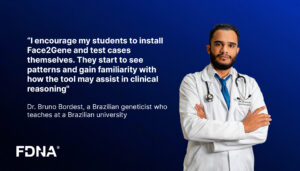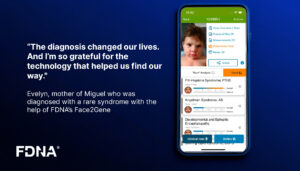Nov 08, 2017
GENOME WEB
“FDNA announced today that it has formed partnerships with the Asia-Pacific Society of Human Genetics (APSHG) and the University of Hong Kong in order to improve its next-generation phenotyping technology in Asia-Pacific populations. Under the terms of the first deal, FDNA will work with the APSHG to train the company’s Face2Gene technology — which uses facial analysis, deep learning, and artificial intelligence to evaluate symptoms of patients with rare genetic diseases and suggest possible diagnoses — to recognize phenotypes for all Asia-Pacific ethnicities. As part of this effort, APSHG will host a meeting at its annual conference in Thailand where FDNA and genetics experts will discuss ways to advance precision medicine in the Asia-Pacific region. FDNA has also launched a center of research excellence at the University of Hong Kong, where researchers will work to improve Face2Gene’s performance with patients of Chinese origin. Up until now, there has been a relatively small amount of actionable genetic data specific to Asia-Pacific populations.”
FDNA, a company specialized in the use of artificial intelligence for phenotyping technologies, has expanded its reach into the Asia-Pacific region through strategic partnerships. The company’s Face2Gene platform, used for diagnosing rare genetic disorders by analyzing facial features, will benefit from these collaborations, which aim to enhance its accuracy and applicability for diverse populations. By incorporating data from the Asia-Pacific region, FDNA intends to improve the tool’s performance and ensure more accurate identification of genetic conditions. This initiative highlights the importance of diversity in clinical decision-support tools and aims to reduce health disparities across different populations.


